I have visited cities where it is great fun to be a capital-“T” Tourist.

Here I am eating pizza on Wall Street in New York City, wearing a dumb Statue of Liberty headpiece. (about as touristy as it gets)
Paris, however, is not one of those cities. Being a solo female tourist in Paris is daunting. Walking down boulevard de Rochechouart, where my hostel is, I found that eyes tended to linger on me—something I’m not accustomed to—and I figured that I must either be very beautiful or very strange to the Parisians, neither of those being particularly reassuring. I am lucky in that I generally don’t live/work in a place frequented by catcallers, so until being in Paris, I never had to learn how to deal with them.
On the British isles, I could fake being a local. I could pass off as one: I even got asked for directions a few times, and I could even give it. But Paris was impenetrable to me. It was partly the language, partly the solitude, the timidity that makes me stick out like a sore thumb.
I dreamt of Paris for so long, and I was so determined to crack it. I was determined to find some kind of home in Paris, like I found in all the other cities I visited. I kept remembering the conversation I had with my flatmate Alex in Edinburgh, when I shared my travel plans post-Scotland. When she found out I was going to Paris, she asked me, “Do you idealize Paris?” Such an oddly phrased question and it rang in my head the whole time I toured the city, once I finally got there. I began to realize that my idealization of Paris was preventing me from truly knowing it: there was Paris in my head, and it was different from the Paris I was experiencing.
I never thought of Paris as being hot and humid, or smelly and crowded. I never thought of the way scammers are quick to spot tourists and take advantage of them. I never imagined being in Paris with hardly a euro to spend, so sick that I could hardly walk in the heat without getting lightheaded, getting up in the middle of the night in my hostel bed because I couldn’t stop coughing.
All this being said, I still want to and believe I can feel at home in Paris. I’d love to wake up in a little Parisian apartment, with the doors open to a Juliet balcony with flowers blooming on the railing. I’d love to ride a bike down to la boulangerie ou la fleuriste and carry a bag of baguettes or bouquet of cut flowers in my arms. I would love to be able to talk to the locals fearlessly in French. Paris was still beautiful to me, and thinking about it now that I am home, I know that when I go back to Paris, I will be ready for her.
On my last full day in Europe, I visited the Père Lachaise cemetery and mused on how quickly the last two months went by. I had seen and done so much, met so many people, that the 7 and a half weeks somehow also managed to seem like it wasn’t a long enough time. And yet the trip that I’d been dreaming about for more than year had come and gone so quickly.
At the cemetery, I visited Oscar Wilde’s grave and memorial, and I kept thinking about a class I had taken with Dr. Miranda Burgess in second year, where she shared pictures of Oscar Wilde’s memorial on her own visit to Paris. I remember her asking the class why we thought people visited graves. I don’t remember the conclusion of that discussion except that it seemed like Miranda was never satisfied with our suggestions.
It occurred to me that day that the whole trip had been structured around exploring a big graveyard of European history, art, culture, and literature. All the places I’d visited were rich with past lives, past moments, and memories.
But in between visiting Shakespeare’s grave in late May and Oscar Wilde’s in early July, I’d managed to also live, and find life. I’d met so many cool people with interesting, funny things to say about places they had come from, had been, and will go to. I had reached my own conclusions about how to live my own life, to make my own art, to write and tell my own story.
So, Dr. Burgess, maybe that’s why we visit graves. A reason to go to a place, but with the hope—and expectation—that we discover something entirely different from the reason we came. I know that’s what happened for me.
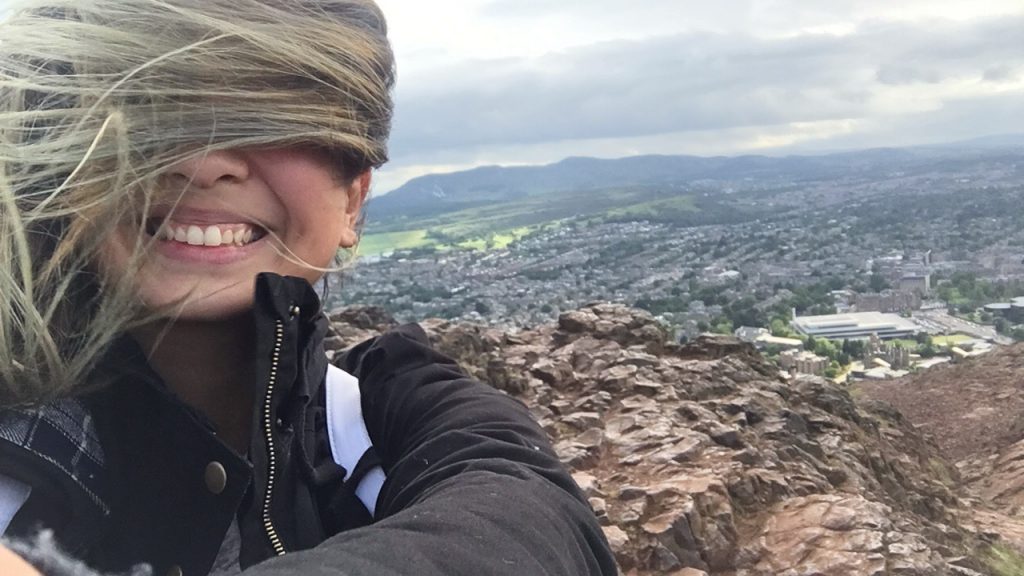
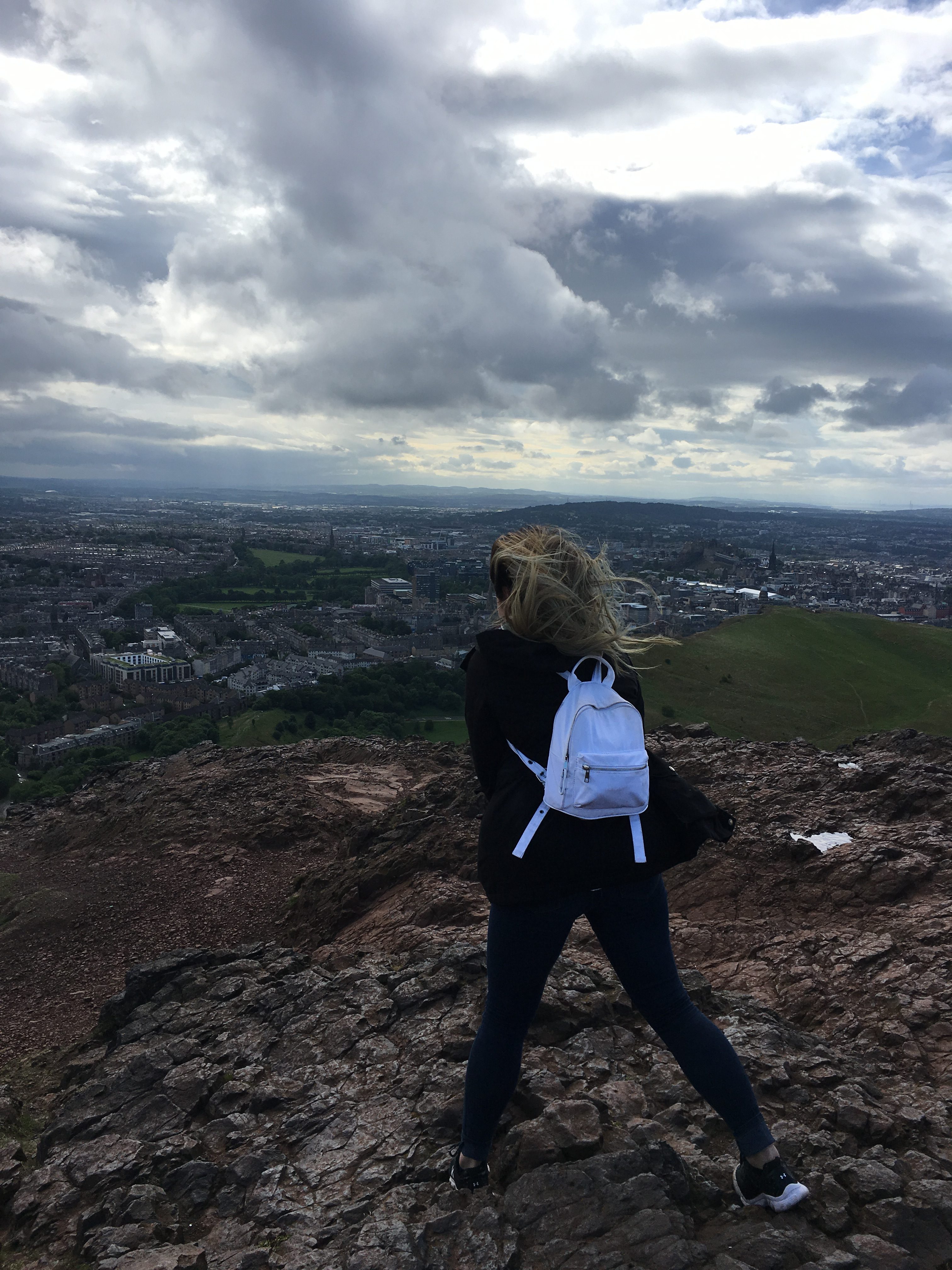
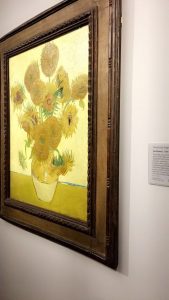 Looking upon Vincent van Gogh’s paintings for the first time, I found myself incredibly moved. In a gallery of paintings and portraits featuring naked babies or figures from myth and legend, I was so drawn—perhaps inexplicably—to van Gogh’s Long Grass with Butterflies, Van Gogh’s Chair, or (my favourite) Sunflowers.
Looking upon Vincent van Gogh’s paintings for the first time, I found myself incredibly moved. In a gallery of paintings and portraits featuring naked babies or figures from myth and legend, I was so drawn—perhaps inexplicably—to van Gogh’s Long Grass with Butterflies, Van Gogh’s Chair, or (my favourite) Sunflowers.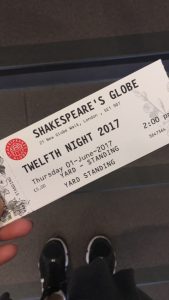 I wasn’t expecting to love Shakespeare’s Globe as much as I do. Watching Twelfth Night was not as I expected—for one thing, the show was quite a diversion from the original text—but I was delighted nonetheless, and watching the play was certainly worth standing for hours. (Although I might splurge on a ticket with a seat next time.)
I wasn’t expecting to love Shakespeare’s Globe as much as I do. Watching Twelfth Night was not as I expected—for one thing, the show was quite a diversion from the original text—but I was delighted nonetheless, and watching the play was certainly worth standing for hours. (Although I might splurge on a ticket with a seat next time.)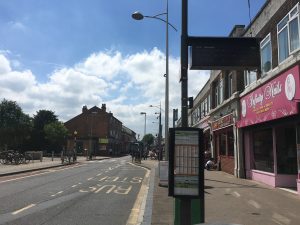 If home is found in the crevices of human experience, homesickness is most certainly found in the expanses of suitcase living: sharing a room, having to take toiletries with you to the bathroom and back, not being able to leave your belongings lying about. (Mommy, if you’re reading this: I leave my room messy because that’s just part of the experience of being at home!) I am excited to be able to leave my toothbrush on the bathroom counter, to unpack my clothes from my suitcase. (Maybe long-term solo travel isn’t for me after all. How distressing.)
If home is found in the crevices of human experience, homesickness is most certainly found in the expanses of suitcase living: sharing a room, having to take toiletries with you to the bathroom and back, not being able to leave your belongings lying about. (Mommy, if you’re reading this: I leave my room messy because that’s just part of the experience of being at home!) I am excited to be able to leave my toothbrush on the bathroom counter, to unpack my clothes from my suitcase. (Maybe long-term solo travel isn’t for me after all. How distressing.) Having said that, though, I don’t think I can stress enough how much the English midlands and the English countryside felt like home to me. As we drove back from Chatsworth House, widely believed to be the inspiration for Mr. Darcy’s Pemberley in Jane Austen’s Pride and Prejudice (one of my favourite books), I looked around at the grids of farmland separated by stone walls and hedges and I found myself thinking about Dr. Dalziel’s Honours seminar on storytelling, and Thomas Hardy’s Far from the Madding Crowd.
Having said that, though, I don’t think I can stress enough how much the English midlands and the English countryside felt like home to me. As we drove back from Chatsworth House, widely believed to be the inspiration for Mr. Darcy’s Pemberley in Jane Austen’s Pride and Prejudice (one of my favourite books), I looked around at the grids of farmland separated by stone walls and hedges and I found myself thinking about Dr. Dalziel’s Honours seminar on storytelling, and Thomas Hardy’s Far from the Madding Crowd.